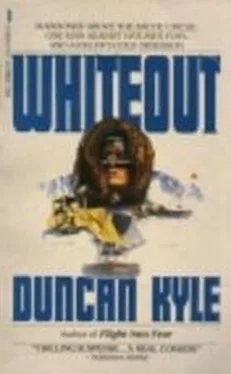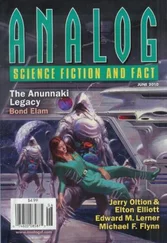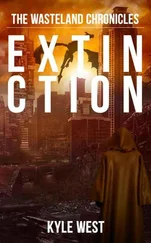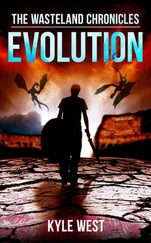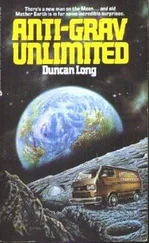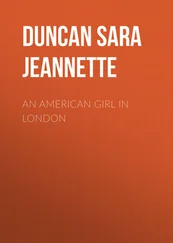Duncan Kyle - Whiteout!
Здесь есть возможность читать онлайн «Duncan Kyle - Whiteout!» весь текст электронной книги совершенно бесплатно (целиком полную версию без сокращений). В некоторых случаях можно слушать аудио, скачать через торрент в формате fb2 и присутствует краткое содержание. Год выпуска: 1976, ISBN: 1976, Жанр: Старинная литература, на английском языке. Описание произведения, (предисловие) а так же отзывы посетителей доступны на портале библиотеки ЛибКат.
- Название:Whiteout!
- Автор:
- Жанр:
- Год:1976
- ISBN:9780312868703
- Рейтинг книги:4 / 5. Голосов: 1
-
Избранное:Добавить в избранное
- Отзывы:
-
Ваша оценка:
- 80
- 1
- 2
- 3
- 4
- 5
Whiteout!: краткое содержание, описание и аннотация
Предлагаем к чтению аннотацию, описание, краткое содержание или предисловие (зависит от того, что написал сам автор книги «Whiteout!»). Если вы не нашли необходимую информацию о книге — напишите в комментариях, мы постараемся отыскать её.
Whiteout! — читать онлайн бесплатно полную книгу (весь текст) целиком
Ниже представлен текст книги, разбитый по страницам. Система сохранения места последней прочитанной страницы, позволяет с удобством читать онлайн бесплатно книгу «Whiteout!», без необходимости каждый раз заново искать на чём Вы остановились. Поставьте закладку, и сможете в любой момент перейти на страницу, на которой закончили чтение.
Интервал:
Закладка:
'Hold it!' I said urgently, and the downward movement stopped. An indecipherable mutter came from the speaker.
I ignored it, and began to examine the surface yard by yard. I could see precious little even from where I sat; lower down it would be impossible to see anything through the ice. Looking for shapes, I saw only shadows as the ice played tricks with the light. The hard hat, though, was visible, a bright orange blob, apparently undamaged, lying to one side of the almost perfectly circular ice sheet.
Minutes ticked by as my eyes swept slowly across every inch of the ice, searching for a dark shape that could be the body of a man. Nothing. I began again, aware that the cracks, white streaks down into the ice sheet, prevented my seeing large portions of the pool, and that the angle of sight reduced my chances. What was needed was what I dared not do : to set the bosun's chair swinging, to take me directly above other areas and to change the line of sight.
Nothing. I stared down, angry and frustrated. Directly below me lay the ten-foot white star where the icicle had crashed down, where the thick ice had crazed like a car's windscreen when a stone hits it. I reasoned that anything falling through the neck must crash on to the ice where the icicle had crashed. However it fell through the chamber neck, gravity would see to that.
'Lower me again,' I said into the handset. 'Stop when I tell you. Can you hear me?'
The sounds that came back were not distinguishable as words any more, but the sequence and pattern told me my instructions were being repeated.
I swung lower, down towards the centre of the star, trying not to think of it as it was : as the central spot of a target, where any crashing ice would fall directly on to me.
'Stop.' I said it with careful clarity, but had to repeat it before movement ceased. I thought for a moment, and said slowly, 'One tap like this' - I rapped the microphone sharply, 'means lower. Two means stop. Three, start hauling me up. Understood?'
A vague crackle.
'Tap if you understand.'
One tap.
I tapped twice, waited, repeated it, and after a moment began to move downward. With my boots three feet from the ice, I tapped sharply twice, and stopped. Nice to know it worked!
The chain saw touched the ice first. I'd forgotten about it for the moment and it would in any case be useless. There was too great a risk of the sound of a petrol engine bringing down hanging ice. As my toes were about to touch, I rapped sharply twice, and the chair stopped. Cautiously, I pressed down. The ice seemed to hold, but it was damaged more than my earlier survey had indicated. Chunks of it had in fact been broken and turned like floating boulders. Little bright lines of water shone in the interstices, making it impossible for me to rest my weight on the ice chunks, big though they were. Unless I swung. Was it possible? I looked upward, shining the lamp along the taut length of cable to where the massed icicles pointed wickedly down at me, and nowhere was the cable more than four feet from them. One tap. Two taps. I moved down another foot, and slid the ice-axe from my belt. My legs were bent now, feet resting flat on a large piece of ice. Leaning forward a little, careful to keep the balance as it was, I shone the light downwards.
The irregular surfaces were white, blue, yet yellowed from the lamp's light, deeply shaded in places, almost bright in others. I searched among them for a glimpse of green or brown, for something to indicate that Kirton's body was here. With the haft of the ice-axe, I began to push at the lumps of ice, turning them, examining each with care as it moved. But there was nothing. I'd have to go up again. I wanted nothing more than to leave this dreadful place, but the thought of doing so with the mystery still as puzzling as ever after the ordeal of the descent, of facing the worse one of the ascent with nothing to show, that prospect repelled me. I sat prodding with a kind of hopeless determination, turned the blocks, searching the cracks. And suddenly, as a chunk tilted, I saw red; not the red of anger, but perhaps the red of blood. Not much: just a small discoloured patch on a flat piece of ice that must have been part of the surface before the impact.
I prodded again and again, but without success, widening the circle in my anxiety, taking risks I shouldn't take. Then suddenly it happened: a block turned and an arm appeared, the hand dead white, the dark green of the sleeve blackened by the water.
Quickly I reversed the ice-axe and extended the metal head towards it. At the first try, it slid limply away. The second time, the curved end caught briefly and a shoulder and head rose slowly to the surface between two ice blocks. Dark hair swam lank in the water, but the body remained face down. But at last I anchored the steel head in the neck of the parka and lifted, and Kirton's face, swollen and white, but unmistakeable, rolled slowly upwards.
What followed took a long time. In the water, the body could be moved, if clumsily. The moment I tried to lift it clear, sheer weight defeated me. I struggled, tiring now and chilled, without any success at all, until I sat still and thought about it as an engineering problem. Finally I managed to pass a loop of line round his shoulders and knot it to the hook beneath the seat of the bosun's chair. It meant jettisoning the saw, but the saw was useless. Also, I remember thinking wryly as I let it go, it wasn't mine. Then, with the ice-axe head, I fished for his legs and hauled them to the surface. At last, leaning precariously over, I reached for the zip of the parka, slid it down and began to search the pockets of his tunic. Why didn't I just give the three taps, have Kelleher haul the two of us up, and search him at leisure on the surface ? Two reasons, both equally strong: first, I wasn't bloody well going to move now until I knew; secondly, I was reasonably certain two men would not be strong enough to haul a combined weight of twenty-five stones and more through four hundred feet. I found a small squarish leather object in a breast pocket, but it was a wallet, not a diary. Stuffing it into my own parka, I fumbled on, my ungloved hand bitterly cold. The diary was in an inside pocket and I knew what it was as soon as I touched it, numbed fingers or no numbed fingers. The diary was sodden, its papers held together by water. I took off my gloves, letting them dangle from the sleeve strap, then opened the diary carefully and began to peel pages apart, at random. The paper, thin but strong, stood up to it. Kelleher was right about one thing: Kirton had been a committed diarist; every page seemed to have its entry, variable as to length, but written-up religiously. I turned towards the back of the little leather-bound book, where the paper was blank, and began to work backwards towards the final entries. The last one said, 'Polar Bear entered Hundred overnight. Entry point clear,but no exit tracks? Maybe shambled out via tractor shed? Life puzzling and dismal. Shouldn't have played Mozart C Maj, last night. Prescribed A Maj, for mental balance, but not wholly successful.'
My hands were getting clumsier as they grew colder. I peeled that page away, then the next, scanning the entries quickly, with the lamp held awkwardly under my arm. Kirton was no Pepys. He simply mentioned each day's events, the music he'd played on his hi-fi, the books he'd read. He'd told me he found Camp Hundred dull, and the tedium showed.
As page followed page, with the entries varying little apart from the titles of the music and books, disappointment crept over me. It began to seem as though I'd made this hellish drop intothe well for nothing. But then: 'Bold glance from the Chameleon. Tell Smales? But what? - A glance and a feeling that young F, was frightened. But events justified fear.'
Читать дальшеИнтервал:
Закладка:
Похожие книги на «Whiteout!»
Представляем Вашему вниманию похожие книги на «Whiteout!» списком для выбора. Мы отобрали схожую по названию и смыслу литературу в надежде предоставить читателям больше вариантов отыскать новые, интересные, ещё непрочитанные произведения.
Обсуждение, отзывы о книге «Whiteout!» и просто собственные мнения читателей. Оставьте ваши комментарии, напишите, что Вы думаете о произведении, его смысле или главных героях. Укажите что конкретно понравилось, а что нет, и почему Вы так считаете.
